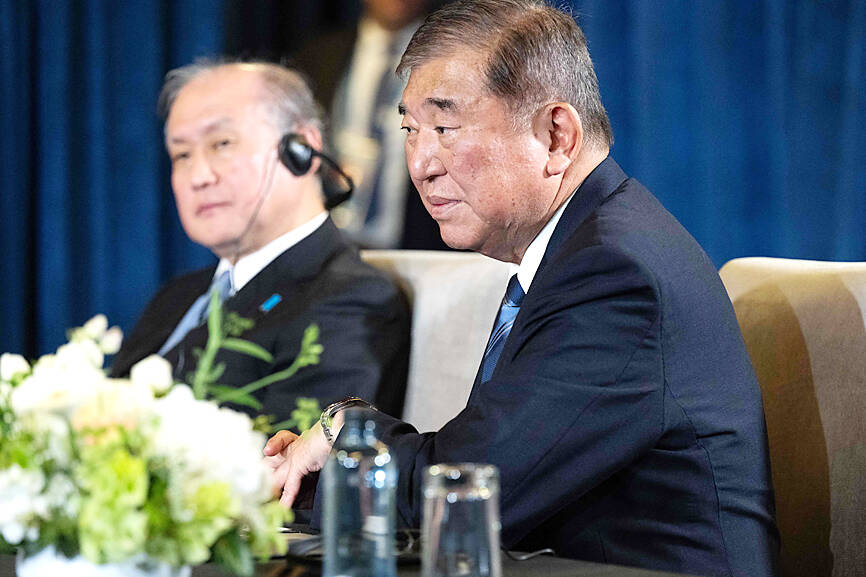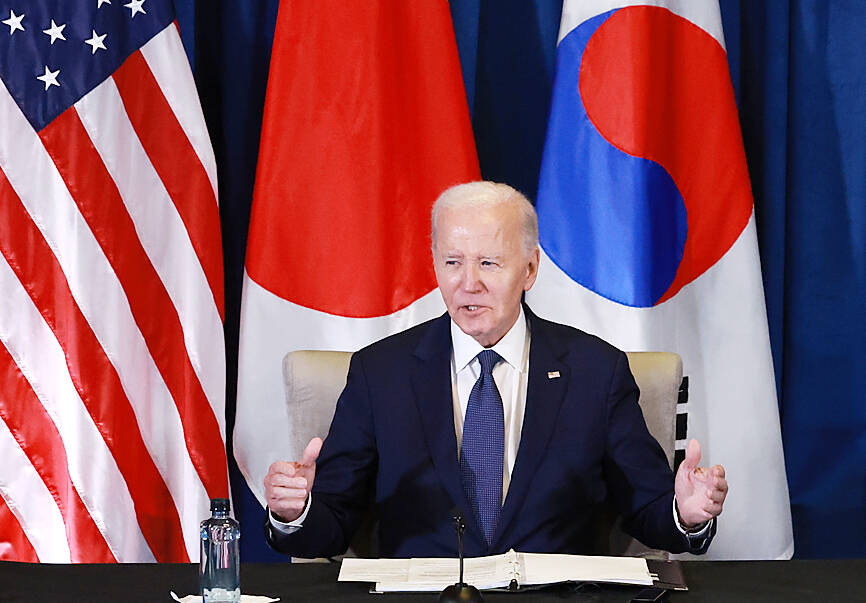The peace and stability of the Taiwan Strait is extremely important to Japan, Japanese Prime Minister Shigeru Ishiba told Chinese President Xi Jinping (習近平) in their first in-person talks, the Japanese Ministry of Foreign Affairs said yesterday.
The remarks came as US President Joe Biden prepared to meet Xi for the last time as president.
Ishiba and Xi agreed to work to expand cultural exchanges and continue high-level dialogue on the economy, Tokyo and Beijing said after the talks on the sidelines of the APEC summit in Peru.

Photo: AFP
Relations between Japan and China have worsened as Beijing builds up its military capacity in the region and Tokyo boosts security ties with the US and its allies.
Ishiba “conveyed serious concerns over the Chinese military’s growing activity” to Xi, the Japanese foreign ministry said.
He stressed that “the peace and stability of the Taiwan Strait is extremely important to Japan and the international community, while also expressing serious concerns over the situation surrounding the South China Sea, Hong Kong and Xinjiang.”

Photo: EPA-EFE
China has ramped up military pressure on Taiwan in the past few years, while also pressing its sweeping territorial claims in the East and South China Seas more stridently.
In Taipei, the Ministry of Foreign Affairs welcomed Ishiba’s remarks.
International security and prosperity are based on the continued peace and stability in the Strait, and Taiwan welcomes democratic countries seeking to maintain safety in the region, it said in a statement.
As a responsible country within the Indo-Pacific region, Taiwan would continue to bolster its self-defense capabilities and work with like-minded partners, such as the US and Japan, to uphold the rules-based international order and foster freedom, peace and prosperity of the Indo-Pacific region and the global community, it added.
At APEC, Ishiba also met outgoing US President Joe Biden and held trilateral talks with Biden and South Korean President Yoon Suk-yeol.
“We strongly oppose any unilateral attempts to change the status quo” in Asia-Pacific waters, the three leaders said in a joint statement, without mentioning China directly.
“We steadfastly oppose the dangerous use of coast guard and maritime militia vessels and coercive activities in the South China Sea,” it said.
Biden and Xi were yesterday expected to huddle on the sidelines of the summit for their first talks in seven months.
Washington is incensed by a recent China-linked hack of the telephone communications of US government and presidential campaign officials, and it is anxious about increasing pressure by Beijing on Taiwan and Chinese support for Russia.
President William Lai (賴清德) is planning to stop in Hawaii and perhaps Guam on a sensitive visit that is sure to anger Beijing in the coming weeks.
At the same time, Beijing’s economy is taking a stiff hit from Biden’s steps on trade, including a plan to restrict US investment in Chinese artificial intelligence, quantum computing and semiconductors, and export restrictions on high-end computer chips.
All of those topics are expected to figure into the talks, US officials said.
Additional reporting by Fang Wei-li and Reuters

WAITING GAME: The US has so far only offered a ‘best rate tariff,’ which officials assume is about 15 percent, the same as Japan, a person familiar with the matter said Taiwan and the US have completed “technical consultations” regarding tariffs and a finalized rate is expected to be released soon, Executive Yuan spokeswoman Michelle Lee (李慧芝) told a news conference yesterday, as a 90-day pause on US President Donald Trump’s “reciprocal” tariffs is set to expire today. The two countries have reached a “certain degree of consensus” on issues such as tariffs, nontariff trade barriers, trade facilitation, supply chain resilience and economic security, Lee said. They also discussed opportunities for cooperation, investment and procurement, she said. A joint statement is still being negotiated and would be released once the US government has made

NEW GEAR: On top of the new Tien Kung IV air defense missiles, the military is expected to place orders for a new combat vehicle next year for delivery in 2028 Mass production of Tien Kung IV (Sky Bow IV) missiles is expected to start next year, with plans to order 122 pods, the Ministry of National Defense’s (MND) latest list of regulated military material showed. The document said that the armed forces would obtain 46 pods of the air defense missiles next year and 76 pods the year after that. The Tien Kung IV is designed to intercept cruise missiles and ballistic missiles to an altitude of 70km, compared with the 60km maximum altitude achieved by the Missile Segment Enhancement variant of PAC-3 systems. A defense source said yesterday that the number of

‘CRUDE’: The potential countermeasure is in response to South Africa renaming Taiwan’s representative offices and the insistence that it move out of Pretoria Taiwan is considering banning exports of semiconductors to South Africa after the latter unilaterally downgraded and changed the names of Taiwan’s two representative offices, the Ministry of Foreign Affairs (MOFA) said yesterday. On Monday last week, the South African Department of International Relations and Cooperation unilaterally released a statement saying that, as of April 1, the Taipei Liaison Offices in Pretoria and Cape Town had been renamed the “Taipei Commercial Office in Johannesburg” and the “Taipei Commercial Office in Cape Town.” Citing UN General Assembly Resolution 2758, it said that South Africa “recognizes the People’s Republic of China (PRC) as the sole

Taiwanese exports to the US are to be subject to a 20 percent tariff starting on Thursday next week, according to an executive order signed by US President Donald Trump yesterday. The 20 percent levy was the same as the tariffs imposed on Vietnam, Sri Lanka and Bangladesh by Trump. It was higher than the tariffs imposed on Japan, South Korea and the EU (15 percent), as well as those on the Philippines (19 percent). A Taiwan official with knowledge of the matter said it is a "phased" tariff rate, and negotiations would continue. "Once negotiations conclude, Taiwan will obtain a better